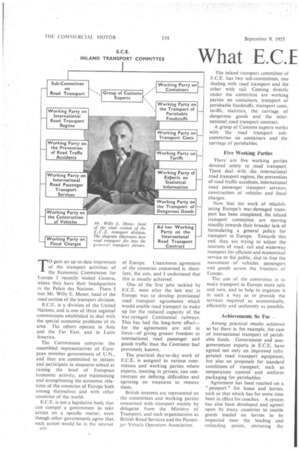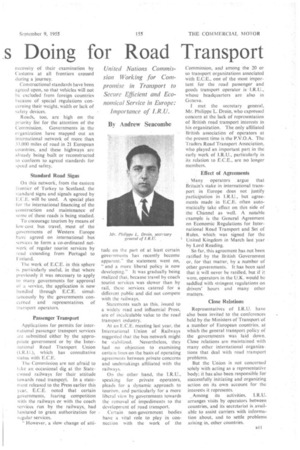What E.C.E
Page 44

Page 45

If you've noticed an error in this article please click here to report it so we can fix it.
s Doing for Road Transport
By Andrew Seaeombe
TO gain an up-to-date impression of the transport activities of the Economic Commission for Europe I recently visited Geneva, where they have their headquarters in the Palais des Nations. There I met Mr. Willy E. Moser, head of the road section of the transport division.
E.C.E. is a division of the United Nations, and is one of three regional commissions established to deal with the special economic problems of its area. The others operate in Asia and the Far East, and in Latin America.
The Commission comprise the assembled representatives of European member governments of U.N., and they are committed to initiate and participate in measures aimed at raising the level of European economic activity, and maintaining and strengthening the economic relations of the countries of Europe both among themselves and with other countries of the world.
E.C.E. is not a legislative body that can compel a government to take action on a specific matter, even though other governments agree that, such action would be in the interest
of Europe. Unanimous agreement of the countries concerned is, therefore, the aim, and I understand that this is usually achieved.
One of the first jobs tackled by E.C.E. soon after the late war in Europe was to develop provisional road transport agreements which would enable road transport to make up for the reduced capacity of the war-ravaged Continental railways. This has had the long-term effect— for the agreements are still in force—of giving greater freedom to international road passenger and goods traffic than the Continent had previously, known.
The practical day-to-day work of E.C.E. is assigned to various committees and working parties where experts, meeting in private, can concentrate on defining difficulties and agreeing on measures to remove them.
British interests are represented on the committees and working parties concerned with transport mainly by delegates from the Ministry of Transport, and such organizations as British Road Services and the Passenger Vehicle Operators Association. The inland transport committee of E.C.E. has two sub-committees, one dealing with road transport and the other with, rail. Coming directly under the committee are working parties on containers, transport of perishable foodstuffs, transport costs, tariffs, statistics, the carriage of dangerous goods and the international road transport contract.
A group of Customs experts works with the road transport subcommittee on containers and the carriage of perishables.
Five Working Parties There are five working parties devoted solely to _road transport. These deal with , the. international road transport regime, the prevention of road traffic accidents, international road passenger transport services, construction of vehicles and fiscal charges.
Now "that the work of rehabilitating Europe's war-damaged transport has been completed, the inland transport committee are tpoving steadily towards their broader task of formulating a general policy for transport in Europe. Towards this end, they are trying to adjust the interests of road, rail and waterway transport for efficient and economical service to the public, and to free the movement of vehicles, passengers and goods across the frontiers of Europe.
The aim of the committee is to make transport in Europe more safe and sure, and to help to organize it in such a way as to provide the services required as economically, efficiently and uniformly as possible.
Achievements So Far .
Among practical results achieved so far there is, for example, the case of international transport of perishable foods. Government and nongovernment experts in E.C.E. have agreed not only on improved refrigerated road transport equipment, but also on proposals for standard conditions of transport, such as temperature control and uniform packaging for perishables.
Agreement has been reached on a " passport " for buses and lorries, such as that which has for some time been in effect for coaches. A system has also been developed and agreed upon by many countries to enable goods loaded on lorries to be inspected near the loading and unloading points, obviating the necessity of their examination by Customs at all frontiers crossed during a journey.
Constructional standards have been agreed upon, so that vehicles will not be excluded from foreign countries because of special regulations concerning their weight, width or lack of safety devices.
Roads, too, are high on the priority list for the attention of the • Commission. Governments in the eiganization have mapped out an international network of more than 33,000 miles of road in 21 European countries, and these highways are already being built or reconstructed to conform to agreed standards for speed and safety.
Standard Road Signs
On this network, from the eastern frontier of Turkey to Scotland, the standard signs and signals agreed by E.C.E. will be used. A special plan
• tor the international financing of the construction and maintenance of some of these roads is being studied. To encourage tourism by means of low-cosi bus travel, most of the governments of Western Europe have agreed on international bus services to form a co-ordinated network of regular tourist services by toad extending from Portugal to Finland.
The work of E.C.E. in this sphere is particularly useful, in that where previously it was necessary to apply to many governments for approval of a service, the application is now handled • through E.C.E. • simultaneously by the governments concerned and representatives of ra nsport operators.
Passenger Transport Applications for permits for international passenger transport services are submitted either by the appropriate government or by the International Road Transport Union (l.R.U.), which has Consultative status with E.C.E.
The Commission are not afraid to ttike an occasional dig at the Stateowned railways for their "attitude towards road transport. In a staten lent released to the Press earlier this year, E.C,E. noted that certain governments, fearing competition with the railways or with the coach services run by the railways,. had hesitated to grant authorization for regular services.
" However, a slow change of atti
tude on the part of at least certain governments has recently become apparent" the statement went on, "and a more liberal policy is now developing," It was gradually being realized that, because travel by coach .tourist services was slower than by rail, these services catered for a different public and did not compete with the railways.
Statements such as this, issued to a widely read and influential Press, are of incalculable value to the road transport industry.
At an E.C.E. meeting last year, the International Union of Railways suggested that the bus network might be stabilized. Nevertheless, they had no objection to examining certain lines on the basis of operating agreements between private concerns and undertakings affiliated with the railways.
On the other hand, the I.R.U., speaking for Private operators, pleads for a dynamic approach. to tourism, and particularly for a more liberal view by governments towards the removal of impediments to the development of road transport.
Certain non-government bodies have a vital role to play in connection with the work of the
Commission, and among the 20 or so transport organizations associated with E.C.E., one of the most important for the road passenger and goods transport operator is .I.R.U., whose headquarters are also in Geneva.
I met the secretary general, Mr. Philippe L. Drain, who expressed concern at the lack of representation of British road transport interests in his organization. The only affiliated British associatiOn of operators at the present time is the P.V.O.A. The Traders Road Transport Association, who played an important part in the early work of I.R.U., particularly in its relation to E.C.E., are no longer members.
Effect of Agreements Many operators argue that Britain's stake in international transport in Europe does not justify participation in I.R.U., but agreements made in E.C.E. often automatiCally take effect on this side of the Channel as well. A notable example is the General Agreement on Economic Regulations for International Road Transport and Set of Rules, which was signed for the United Kingdom in March last year by Lord Reading.
So far, this agreement has not been ratified by the British Government or, for that matter, by a number of other governments. It has been said that it will never he ratified, but if it were, operators in the U.K. would be saddled with stringent regulations on drivers' hours and many other matters.
Close Relations
Representatives of I.R.U. have also been invited to the conferences held by the Ministers of Transport of a number of European countries, at which the general transport policy of the governments was laid down. Close relations are maintained with many other international organizations that deal with road transport problems.
But the Union is not concerned solely With acting as a representative body; it has also been responsible for successfully initiating and organizing action on its own account for the interests it represents. •
Among its activities, I.R.U. arranges visits by operators between countries, and its secretariat is available to assist carriers with information about, and to settle problems . arising in, other countries.




























































































